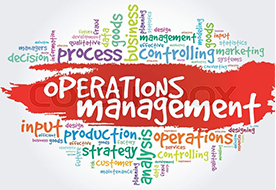
Administrating business practices relevant to designing and production of an organization, operations management plays a crucial role in taking the business ahead. Handling many aspects starting from systematizing and forecasting the production strategies to managing and scrutinizing the production process, an effective and efficient operation management contributes in the deliverance of finer merchandise. However, by implementing ERP the business can ensure on-time and up to the mark production as well as delivery which are eminent for the sustenance in the competitive world. ERP will certainly grant an upper hand in the management of operations with real-time report generation and process automation benefiting accuracy, efficiency and speed at the same time.
To understand the concept of ERP better and how its implementation in operations management can enhance business growth the points mentioned below can be of assistance.
- Data Integration: An all-inclusive platform that accumulates the data from various departments, ERP stores relevant data for smooth and successful workflow. This includes an inventory of materials and components, tracking what are deficient, total consumption of raw materials and many other relevant and essential figures. Storing all the information in a single database gives a possibility of effective communication between various departments and flawless management due to clear data and information.
- Process Automation: Tasks such as accounting, forecasting, reporting, processing, payments, and invoicing doesn’t need human intervention after an effective ERP implementation in the business process. Making the workflow run smoothly and error-free, ERP exterminates the excess time consumption criteria. Without much human intervention, the ERP enabled processes also reduce the chances of the possibilities of manual errors.
- Analysis and Reports: Only collecting and storing data is just not enough, but there should be also the proper analysis and process of information for unblemished workflow. Contributing significantly to information processing and report generation, ERP fuels the growth of business productivity. As important business decisions depend exclusively on the information generated from analyzed data, reports originated from them can prepare the business beforehand for the future.
- CRM: Irrespective of the size of the company, Customer Relationship Management (CRM) is crucial for the market expansion of a business. Much more effective than standard spreadsheets, ERP gathers all the relevant information of customers and utilize them effectively in marketing campaigns, sales automation, and also for customer satisfaction.
- SCM: Supply Chain Management (SCM) is crucial for obtaining a 360- degree view over the availability of production material and their expenditure over time. ERP solutions keep track of the supply chain through advanced software and manage the overall production management process.
- Finance and Accounting: Financial stability holds the utmost necessity for an organization strengthening its position in the market. Providing various important tools for proficient accounting relevant to payables, receivables including assets and task management, ERP ensures a customized financial solution as per the business need of the organization.
- Quality Management: In every organization, quality management is ensured by the availability of acceptable raw materials, unperturbed production process and quality end products. By supervising the supply chain and production outline, ERP ascertains the manufacturing of products matching the current industry standard. Apart from that, it also ensures that nothing goes wrong while the distribution as it may affect the overall profit generation of the organization.
